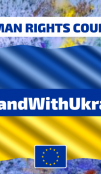Women raising the torch of humanitarian action

By welcoming the distinguished panellists, EU Ambassador Walter Stevens, highlighted that gender inequalities have never been more exposed than in the current pandemic, which is not a sign of their weakness but of gender inequality. "We have to ensure that women’s rights are at the core of our humanitarian operations, and that women’s and girls’ agency and participation in decision-making processes are being secured, since women and girls play an active and important role in contributing to peace and resilience", he underlined. With regard to the EU's commitment he said: "We are fully committed to this objective and we are proud to have launched and supported the Gaziantep Women Platform which comprises more than 40 women including many operating in the humanitarian field as the EU’s flagship project to empower Syrian women."
https://twitter.com/EU_UNGeneva/status/1310948854267817987
“We have to understand the situation of women and we have to speak up”
Assistant High Commissioner for Protection at the UNHCR Gillian Triggs drew attention to the many “everyday heroes”, particularly refugee women, who support vulnerable people through their brave initiatives and concrete humanitarian actions. She shared insides from her recent visit of the Moria refugee camp in Greece, where women expressed their concerns about sexual abuse and their inability to report such incidences. In the view of severe women’s rights violations in humanitarian setting, Triggs emphasized: “We have to understand the situation of women and we have to speak up to ensure that women are properly protected.”
https://twitter.com/EU_UNGeneva/status/1310955666836729864
“When it comes to gender equality, we have made progress, but we need to make much more progress!”
Reminding the audience of the 25th anniversary of the landmark Beijing Declaration on women’s rights this year, Mary Robinson, former UN High Commissioner for Human Rights critically pointed out that no country can stand up saying "we actually have achieved full gender equality". Based on her experience of many years in the humanitarian field, she acknowledged that the UN Resolution 1325, calling for women’s equal participation in conflict resolution and peacebuilding, marked an important step but also still requires more concrete policies and action. "Gender quotas would represent a concrete instrument to address the gender imbalances, to make women’s voices at the local level heard", she indicated.
https://twitter.com/EU_UNGeneva/status/1310961550363107331
"We need to listen to the voices of women on the grounds, those who are making peace.”
The aspect of women’s representation and participation in humanitarian settings was also brought up by Leymah Gbowee, Nobel Peace Prize Laureate, Founder and President of Gbowee Peace Foundation Africa, who stressed that international bodies should adequately recognise women’s valuable resources and abilities to build peace. As a concrete example, she mentioned the need for translators as a way to empower women at the local level and to ensure their involvement. At the same time, she reiterated the need for women’s participation not only on the ground but at all levels: “To build peace, women have to be at the table where decisions are being made.”
https://twitter.com/EU_UNGeneva/status/1310968746375360514
“We need to raise the torch even higher for women in humanitarian action”, concluded Andranik Hovhannisyan, Ambassador of Armenia in Geneva, who moderated the event. In the light of the shared experiences, all agreed on the need for further actions to promote women’s meaningful and indispensable participation in the humanitarian field and to address remaining challenges in terms of gender parity at all decision-making levels.





